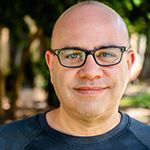The American Journalism Historians Association will have an electronic election in September to fill three open positions on the Board of Directors. Ballots will be emailed to all members and also will include approval of the 2019 General Member Business Meeting Minutes and three proposed amendments to the Constitution and Bylaws.
We will not have an election for second vice-president this year. Given the unprecedented global health crisis that forced AJHA to opt for a virtual conference this fall, the membership agreed to pause the presidential leadership chain for one year. Donna Lampkin Stephens will remain president. Aimee Edmondson will remain first vice-president, and Mike Conway will remain second vice-president.
Members nominated the following three scholars for the three open board seats. The electronic ballot will include a space for write-in votes.
Julien Gorbach
 Boston native Julien Gorbach is an assistant professor in the School of Communications at the University of Hawaii at Manoa. His book The Notorious Ben Hecht: Iconoclastic Writer and Militant Zionist was published by Purdue University Press in March 2019, and it earned the National Jewish Book Award “Finalist” prize for Best Biography. His chapter “Not Your Grandpa’s Hoax: A Comparative History of Fake News” appeared in Fake News! Misinformation in the Media (LSU Press, June 2020), and his studies have been published in American Journalism, Journalism History and Literary Journalism Studies. He currently serves as the chair of AJHA’s Public Relations Committee. Gorbach earned his doctorate at the Missouri School of Journalism in 2013. Before that he worked as a newspaper reporter for ten years. His articles have appeared in the Boston Globe, The Boston Phoenix, Time Out New York, The San Francisco Bay Guardian, and the New Orleans Gambit.
Boston native Julien Gorbach is an assistant professor in the School of Communications at the University of Hawaii at Manoa. His book The Notorious Ben Hecht: Iconoclastic Writer and Militant Zionist was published by Purdue University Press in March 2019, and it earned the National Jewish Book Award “Finalist” prize for Best Biography. His chapter “Not Your Grandpa’s Hoax: A Comparative History of Fake News” appeared in Fake News! Misinformation in the Media (LSU Press, June 2020), and his studies have been published in American Journalism, Journalism History and Literary Journalism Studies. He currently serves as the chair of AJHA’s Public Relations Committee. Gorbach earned his doctorate at the Missouri School of Journalism in 2013. Before that he worked as a newspaper reporter for ten years. His articles have appeared in the Boston Globe, The Boston Phoenix, Time Out New York, The San Francisco Bay Guardian, and the New Orleans Gambit.
What AJHA has meant to me and why I want to serve: AJHA has been my scholarly community for more than a decade, since I presented my first study at our March 2008 joint conference. The association has provided peers who are now among my closest friends, and extraordinary mentors like Berkley Hudson, Ross Collins, Kathy Roberts Forde, Mike Sweeney, Ford Risley, and Donna Lampkin Stephens. AJHA has taught me not just methods and insights into historiography; it also instilled in me the ethos of our field and has shown me why our work is so important. The association has been a constant source of support, encouragement and collegiality, and our members all appreciate how much that means whenever we find ourselves buried deep in the archives, or in the tenth draft of a particularly thorny study. This past year was my first opportunity to contribute service as chair of our public relations committee. I would be honored to help further build and strengthen our organization by serving on our board of directors, so that we can assist our seasoned scholars in expanding upon their achievements and invite the younger scholars on board, just as the association so graciously did for us.
Jennifer Moore
 Jennifer E. Moore is an Associate Professor of Journalism at the University of Minnesota Duluth. She received her Ph.D. from the School of Journalism and Mass Communication at the University of Minnesota Twin Cities. Her research interests include journalism history, visual communication, participatory news practices and digital news preservation. Moore’s work on the nineteenth-century illustrated press appears in issues of Journalism History and several chapters in media history collections, including Sensationalism: Murder, Mayhem, Mudslinging, Scandals, and Disasters in 19th-Century Reporting (Transaction Publishers, 2013) and After the War: The Press in a Changing America, 1865–1900 (Transaction Publishers, 2017). An essay about her participatory news scholarship appears in the forthcoming Journalism Research that Matters (Oxford University Press). From 2014 to 2016, she served as a co-coordinator for the Joint Journalism and Communication History Conference. Her research awards include funding from the National Association of Broadcasters and two National Endowment for the Humanities Summer Scholar Awards. She teaches courses in media history, digital journalism, social media, and media ethics. Prior to academia, Moore worked as a radio reporter and as a digital content producer and manager.
Jennifer E. Moore is an Associate Professor of Journalism at the University of Minnesota Duluth. She received her Ph.D. from the School of Journalism and Mass Communication at the University of Minnesota Twin Cities. Her research interests include journalism history, visual communication, participatory news practices and digital news preservation. Moore’s work on the nineteenth-century illustrated press appears in issues of Journalism History and several chapters in media history collections, including Sensationalism: Murder, Mayhem, Mudslinging, Scandals, and Disasters in 19th-Century Reporting (Transaction Publishers, 2013) and After the War: The Press in a Changing America, 1865–1900 (Transaction Publishers, 2017). An essay about her participatory news scholarship appears in the forthcoming Journalism Research that Matters (Oxford University Press). From 2014 to 2016, she served as a co-coordinator for the Joint Journalism and Communication History Conference. Her research awards include funding from the National Association of Broadcasters and two National Endowment for the Humanities Summer Scholar Awards. She teaches courses in media history, digital journalism, social media, and media ethics. Prior to academia, Moore worked as a radio reporter and as a digital content producer and manager.
What AJHA has meant to me and why I want to serve: I will never forget the first time I attended AJHA as a graduate student and was pleasantly surprised to receive a stipend to offset my travel expenses. It's that kind of commitment to developing and supporting scholars that has kept me involved. As a former co-coordinator for the Joint Journalism and Communication History Conference (JJCHC), I am excited by an opportunity to be in service to our discipline again as an AJHA board member. I want to continue the work of those before me who have helped communicate the importance of journalism history, not only among scholars but also to a general audience. Our work as journalism and media historians is more important than ever. What we do as scholar-teachers is needed to help understand our current moment as we negotiate both a global health pandemic and efforts to dismantle systemic racism in the U.S.
Rich Shumate
 Rich Shumate is an assistant professor in the School of Media at Western Kentucky University and holds a Ph.D. in mass communication from the University of Florida. His research centers on historical political communication, specifically news media coverage of U.S. political conservatism in the 1950s and 1960s. He was the winner of AJHA’s Margaret Blanchard Award for Outstanding Dissertation in Journalism History in 2019, and he is currently proceeding to publication with a book based on that work, The Liberal Bias Rebellion: How Coverage of Goldwater Made Conservatives Hate Media, which will be published by Lexington Books in 2021. Prior to moving into academia, Shumate worked for more than 25 years as a professional journalist on newspapers in North Carolina and Georgia and spent 10 years as a news editor and web writer at CNN’s world headquarters in Atlanta. He is also the founder and editor of ChickenFriedPolitics.com, a blog covering politics across 14 Southern states.
Rich Shumate is an assistant professor in the School of Media at Western Kentucky University and holds a Ph.D. in mass communication from the University of Florida. His research centers on historical political communication, specifically news media coverage of U.S. political conservatism in the 1950s and 1960s. He was the winner of AJHA’s Margaret Blanchard Award for Outstanding Dissertation in Journalism History in 2019, and he is currently proceeding to publication with a book based on that work, The Liberal Bias Rebellion: How Coverage of Goldwater Made Conservatives Hate Media, which will be published by Lexington Books in 2021. Prior to moving into academia, Shumate worked for more than 25 years as a professional journalist on newspapers in North Carolina and Georgia and spent 10 years as a news editor and web writer at CNN’s world headquarters in Atlanta. He is also the founder and editor of ChickenFriedPolitics.com, a blog covering politics across 14 Southern states.
What AJHA has meant to me and why I want to serve: I first became aware of AJHA when I was in graduate school at the University of Arkansas-Little Rock and working as a research assistant for Sonny Rhodes, who introduced me to the organization and spoke highly of it. My first convention was in St. Petersburg, where I, literally, drove through a hurricane to attend; my first presentation as a faculty member came in Salt Lake where I regaled people with details of the 1959 cranberry panic. I have enjoyed making friends and connections at AJHA with people who share my passion for media history, and I come away from conferences stimulated not only with ideas for research projects but ideas for the American news media history class that I created and teach at WKU. In 2017, I also signed on as AJHA’s web editor, taking over a smooth-running operation so ably constructed by Erika Pribanic-Smith, and have enjoyed working with the various committees to put together the convention micro-sites. I am interested in serving on the board because I believe organizations only work effectively if members are willing to step up and contribute what they can. I have enjoyed my membership in AJHA and have gotten a lot out of the experience, so I’d like to give back.

